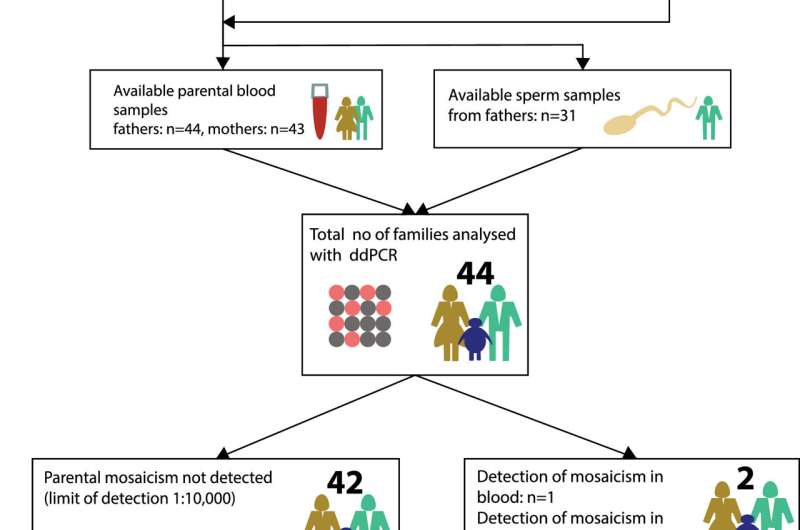Analysing sperm can detect rare genetic variants

Researchers from Karolinska Institutet have analyzed blood and sperm samples from healthy parents to children with genetic syndromes and the results indicate that germline mosaicism is underestimated as a cause to syndromes and that the level of the genetic variant is higher in sperm than in blood. The study was recently published in Molecular Genetics & Genomic Medicine.
Just like mosaic piles covering a bathroom floor, our human cells can look and behave differently from each other. An explanation for this is genetic mosaicism and means that there is more than one genetic composition within the same individual. Healthy people may have a genetic mutation confined to their gonads. This is called germline mosaicism. In the case of germline mosaicism, the offspring may inherit the mutational event in all his/her cells and develop severe symptoms.
In this study, researchers looked for germline mosaicism in 87 healthy parents to children diagnosed with genetic de novo-syndromes with a method called droplet digital PCR. This is a more sensitive method than what is used in the regular clinical assessment. They found mosaicism in two healthy fathers by investigating blood and sperm. By comparing blood and sperm, they also found that the level of mosaicism was higher in sperm than in blood in both cases. The results indicate that germline mosaicism is underestimated as a cause to genetic de novo-syndromes in children.
"To understand the mechanisms behind a rare disease is the key for establishing appropriate care, such as surveillance and treatment. It also improves the genetic counseling to the patients and their parents regarding recurrence risk. These results may have an impact on how the clinical assessment is managed, regarding choice of method and what tissue to analyze," says Sofia Frisk, MD, Clinical Genetics, Karolinska Universitetssjukhuset and Ph.D. student, Karolinska Institutet, who is first author of the paper.
More information: Sofia Frisk et al, Detection of germline mosaicism in fathers of children with intellectual disability syndromes caused by de novo variants, Molecular Genetics & Genomic Medicine (2022). DOI: 10.1002/mgg3.1880





















